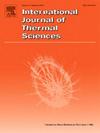A study on full-domain transient temperature reconstruction and backward sensor placement for distributed heat source systems
IF 5
2区 工程技术
Q1 ENGINEERING, MECHANICAL
International Journal of Thermal Sciences
Pub Date : 2025-02-28
DOI:10.1016/j.ijthermalsci.2025.109823
引用次数: 0
Abstract
Online estimation of the full-domain temperature field from sparse local measurements is widely desired in effective analysis of thermal behavior, closed-loop control, and state tracking for heat-source systems. Despite advances in inversion techniques, these methods mainly focus on steady-state conditions and are often application-dependent. Moreover, existing forward sensor placement methods only yield a single sub-optimal combination. For efficient online thermal monitoring based on limited observations, a transient-state reconstruction technique and sensor placement for complex heat-source systems are described. In offline preparation, proper orthogonal decomposition (POD) is employed to identify dominant eigenvectors from representative high-fidelity temperature fields, capturing the distribution and evolutionary patterns of heat-source systems. Subsequently, a novel intelligent method, Improved Coral Reef Optimization (ICRO), which provides a new and reliable option for solving sophisticated optimization problems, and two associated backward sensor placement strategies with objective criterion of cross-validation L2 norm error, are proposed for diverse sensor layouts and high-quality reconstruction. During online phase, coefficients of dominant eigenvector set are dynamically and robustly solved based on least squares estimator and sparse measurements, allowing for real-time inference of global thermal state. Addressing the lack of references regarding performance improvement, the influence of key parameters on reconstruction was firstly investigated with analytical models, and sensor placement optimization strategy was preliminarily validated. Finally, comprehensive evaluations of proposed sensor placement and reconstruction were conducted in two typical cases of complex heat-source systems under various operating conditions: the simulation of multi-chip printed circuit board (PCB) with anisotropic conductivity, and the experimental case of variable heat-source system. These assessments demonstrated the effectiveness and reliability of the sensor placement strategy and online reconstruction.
分布式热源系统全域瞬态温度重构及反向传感器放置研究
基于稀疏局部测量的全域温度场在线估计在热源系统热行为、闭环控制和状态跟踪的有效分析中被广泛需要。尽管反演技术取得了进步,但这些方法主要集中在稳态条件下,并且往往依赖于应用。此外,现有的前向传感器放置方法只能产生单一的次优组合。为了实现基于有限观测值的有效在线热监测,介绍了一种瞬态重建技术和复杂热源系统的传感器放置。在离线制备中,采用适当的正交分解(POD)从具有代表性的高保真温度场中识别优势特征向量,捕捉热源系统的分布和演化模式。随后,提出了一种新的智能方法——改进珊瑚礁优化(ICRO),该方法为解决复杂的优化问题提供了一种新的可靠的选择,并提出了两种基于交叉验证L2范数误差客观准则的传感器反向放置策略,以实现不同的传感器布局和高质量的重建。在在线阶段,基于最小二乘估计和稀疏测量动态鲁棒求解优势特征向量集系数,实现对全局热状态的实时推断。针对性能改进方面文献不足的问题,首先利用解析模型研究了关键参数对重构的影响,并初步验证了传感器放置优化策略。最后,对不同工作条件下复杂热源系统的两个典型案例:具有各向异性电导率的多芯片印刷电路板(PCB)仿真和可变热源系统的实验案例,对所提出的传感器放置和重构进行了综合评价。这些评估证明了传感器放置策略和在线重建的有效性和可靠性。
本文章由计算机程序翻译,如有差异,请以英文原文为准。
求助全文
约1分钟内获得全文
求助全文
来源期刊

International Journal of Thermal Sciences
工程技术-工程:机械
CiteScore
8.10
自引率
11.10%
发文量
531
审稿时长
55 days
期刊介绍:
The International Journal of Thermal Sciences is a journal devoted to the publication of fundamental studies on the physics of transfer processes in general, with an emphasis on thermal aspects and also applied research on various processes, energy systems and the environment. Articles are published in English and French, and are subject to peer review.
The fundamental subjects considered within the scope of the journal are:
* Heat and relevant mass transfer at all scales (nano, micro and macro) and in all types of material (heterogeneous, composites, biological,...) and fluid flow
* Forced, natural or mixed convection in reactive or non-reactive media
* Single or multi–phase fluid flow with or without phase change
* Near–and far–field radiative heat transfer
* Combined modes of heat transfer in complex systems (for example, plasmas, biological, geological,...)
* Multiscale modelling
The applied research topics include:
* Heat exchangers, heat pipes, cooling processes
* Transport phenomena taking place in industrial processes (chemical, food and agricultural, metallurgical, space and aeronautical, automobile industries)
* Nano–and micro–technology for energy, space, biosystems and devices
* Heat transport analysis in advanced systems
* Impact of energy–related processes on environment, and emerging energy systems
The study of thermophysical properties of materials and fluids, thermal measurement techniques, inverse methods, and the developments of experimental methods are within the scope of the International Journal of Thermal Sciences which also covers the modelling, and numerical methods applied to thermal transfer.
 求助内容:
求助内容: 应助结果提醒方式:
应助结果提醒方式:


